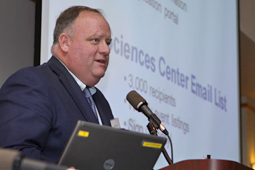Life sciences summit fosters N.E.-Israel links
Talented workers, top universities and well-established community attract entrepreneurs

Above, Ted Carr of Massachusetts Office of International Trade and Investment; on BrandeisNOW front page, Susan Windham-Bannister Ph.D, '’77 of Massachusetts Life Sciences Center and Tom Sommer of Massachusetts Medical Device Industry Council.
The summit aims to expand research and investment alliances between the life sciences industries of New England and Israel. The two-day event comes as U.S. states, and countries around the world, are emerging from financial crisis and seeking to attract capital and drive innovation.
In addition to local participants, the summit hosted a delegation from Israel that included CEOs from 15 of the country’s most promising pharmaceutical, biotech and medical device companies, venture capitalists, and others. Aaron Ciechanover, Nobel laureate in chemistry and professor at the Technion -- the Israel Institute of Technology -- in Haifa, gave the keynote address.
This is the second consecutive year Brandeis has hosted the summit. Bruce R. Magid, dean of IBS, said the conference "underscores Brandeis’s commitment to nurture intellectual and business connections between U.S. and Israeli companies. The life sciences community can indeed create a more prosperous world by working together at the fruitful intersection of scientific discovery and business partnership.”
A study commissioned in part by Combined Jewish Philanthropies and presented at the summit showed that 100 companies in Massachusetts were founded by Israelis or offer products based on Israeli technology. Half of these businesses focus on information technology and 29 percent are in life sciences. Last year the companies generated a total of $7.8 billion in direct and indirect revenue for the state and accounted for 5,920 jobs, according to the study.
“Massachusetts is a magnet for Israeli start-ups,” said David Goodtree ’84, an advisor at the business council and a panelist at the summit. “Israeli entrepreneurs and researchers are drawn to the region because of its deep talent pool of educated workers, its ecosystem of supporting partners – including a huge industry concentration, world-class universities, and the well-established Israeli community here.”
The Israel-Massachusetts partnership “is in an accelerating engine of growth, but competition from other states is intensifying,” said Goodtree, noting that California, New Jersey, Virginia and Maryland are among the states aggressively courting Israeli linkups.
The Bay State, too, is pursuing a formal tie, according to Ted Carr, head of the Massachusetts Office of International Trade and Investment, who also was a panelist.
Massachusetts is “in very active negotiations on a trade agreement with Israel,” said Carr, whose group oversees foreign direct investment in the state, and operates five offices around the world including sites in Brazil, Germany, Mexico, and China. “We hope to have news very soon.” He said that while Massachusetts already is home
to 127 colleges and universities, a very large venture-capital industry by population, and many acclaimed research hospitals, the trade office is “making further strategic investments to improve business conditions in the state.”
Strengthening the Massachusetts-Israeli economic partnership is also one of the priorities of Susan Windham-Bannister Ph.D. ’77, who is president and CEO of the Massachusetts Life Sciences Center, a quasi-public agency created in 2006. The center is tasked with implementing Gov. Deval Patrick’s Massachusetts Life Sciences Initiative -- a $1 billion investment over ten years to strengthen the state’s leadership in the industry. Windham-Bannister said the organization is “working hard at outreach” toward Israeli entrepreneurs.
She noted several opportunities for Massachusetts-Israeli relationships, including the center's funding for discovery, technology transfer, and commercialization.
Categories: Business, International Affairs, Science and Technology





